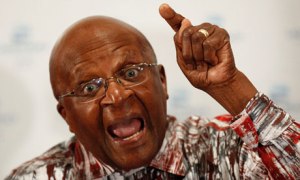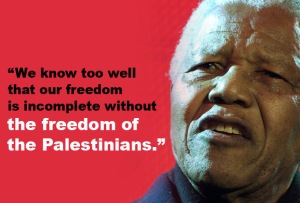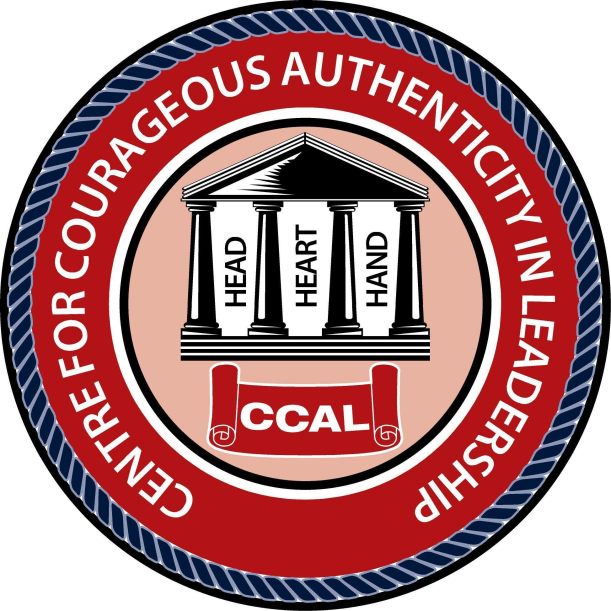 Human beings are obscure as members of the outgroup within a large system designed for insiders, simply because the ingroup members create a system of wilful blindness. It is this system that seeks to deny the right of those that do not look like the dominant to belong, by denying their existence, when it matters most. The obscurity so suffered by the members of the outgroup has nothing to do with their lack of character, stature or presence. It is a deliberate attempt by the ingroup members to dehumanize all those whom they perceive not to belong. The ingroup members suffer a superiority complex that is predicated on a very weak soul, for they need others to fall off the radar for them to appear to be stronger, or as the only humans worth recognition. It is for that reason that outgroup members, collectively and individually, need to use their obscurity as a source of power, instead of succumbing to the insignificance accorded to them.
Human beings are obscure as members of the outgroup within a large system designed for insiders, simply because the ingroup members create a system of wilful blindness. It is this system that seeks to deny the right of those that do not look like the dominant to belong, by denying their existence, when it matters most. The obscurity so suffered by the members of the outgroup has nothing to do with their lack of character, stature or presence. It is a deliberate attempt by the ingroup members to dehumanize all those whom they perceive not to belong. The ingroup members suffer a superiority complex that is predicated on a very weak soul, for they need others to fall off the radar for them to appear to be stronger, or as the only humans worth recognition. It is for that reason that outgroup members, collectively and individually, need to use their obscurity as a source of power, instead of succumbing to the insignificance accorded to them.
Through focused personal purpose, in relation to the system they serve, all humans can rise to the occasion of living highly impactful lives, despite limitations of a system, if and only if, we study the system dynamics and work it to the advantage of all. It is about being smart about what you LOVE, connecting that to what the world NEEDS, monetising it and then ensuring that you are GOOD at it. It is that being GOOD, that I would like to latch on, for it includes being able to WORK the system, intentionally, for the benefit of all. Anyone whom you exclude, it must be because you are protecting the integrity of the system.
As Dr. Chuba Okadigbo said:
“If you are emotionally attached to your tribe or political leaning to the point that truth and justice become secondary considerations, your education is useless, your exposure is useless. If you cannot reason beyond petty sentiments and tribal attachments, you are a liability to mankind.”
This message rings true for both ingroup and outgroup members of any tribe, sub-tribe, Board, Executive Committee or team. It is for that reason that I advocate for diversity and inclusion, even of the wilfully blind members of our society, unless, otherwise, of cause, all that has been tried has failed.
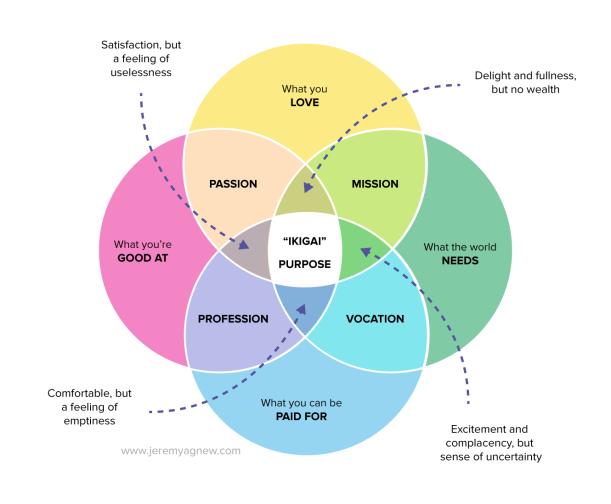
Seeing self, the collectives (as complex as they are), the chosen purpose/ikigai and the lenses through which all the seeing happens, is a first step towards using obscurity as a source of power. For some, the concept of ingroup and outgroup dynamics is more like a foreign concept, and what makes it difficult to understand is that these groups are not fixed, but dynamic in nature. Here is a basic description:
In sociology and social psychology, an ingroup is a social group to which a person psychologically identifies as being a member. By contrast, an outgroup is a social group with which an individual does not identify. For example, people may find it psychologically meaningful to view themselves according to their race, culture, gender, age, or religion. It has been found that the psychological membership of social groups and categories is associated with a wide variety of phenomena.
The terminology was made popular by Henri Tajfel and colleagues during his work in formulating social identity theory. The significance of ingroup and outgroup categorization was identified using a method called the minimal group paradigm. Tajfel and colleagues found that people can form self-preferencing ingroups within a matter of minutes and that such groups can form even on the basis of seemingly trivial characteristics, such as preferences for certain paintings.
Ref: https://en.wikipedia.org/wiki/Ingroups_and_outgroups
As birds flock and fish school, so do humans tribe, paraphrasing David Logan of Tribal Leadership, an essential book on the subject. Deep awareness of self and others, including their intentionality can only happen when we are intentionally focused. Eyes only, are limited and cannot see the depth of self as well as that of others, hence in our quest to understand, we may be fooled by what we see, and for that reason, I recommend seeing with the heart. Let us look at the diagram below, to understand the complexity of it all:
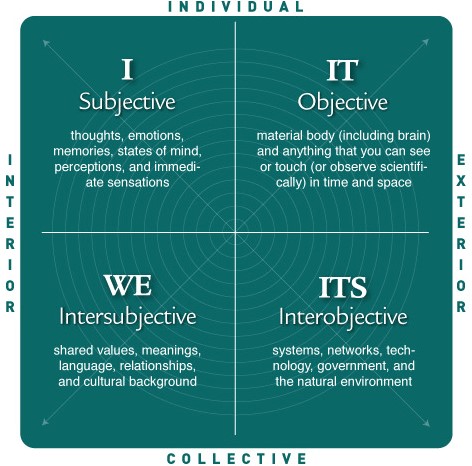
Ref.: https://integrallife.com/four-quadrants/
Trying to understand the individuals in the workplace, I (as in quadrant 1, the Subjective) without language and conversations, is akin to using the doctors’ stethoscope without medical school training, and thereby failing dismally to understand the symptoms presented by a sick patient. Where thoughts, emotions, memories and more are located, as illustrated above, is a mystery to all, for they sit inside all of us, and cannot be accessed without deep conversations. All can lay claim to any beliefs and values as their own, when in casual conversation; it is only when we have both, deep conversations and we observe behaviour, under difficult conditions, that we are able to draw a trustworthy link. Trust begins to emerge, with self, through reflection and observation, by drawing causal links between what we believe in and what we do, what others say and what they do. It is for that reason that I say we need to see and look at others with the heart, especially in the context of power dynamics. The eyes alone are inadequate, to see through masks and ill intentions of others, same applies to good intentions, and good people: we may just miss them, if we do not engage deeply and sincerely.
Professional intimacy becomes the key to driving powerful and human-driven growth for individuals, teams, business units and large-scale corporations. Many have given up on the quest to collaboratively exist with others, whether it be within the smallest organisation, as in couples, or large corporations. Trust is a real issue and most decide to just do me, to the detriment of collaborations. It is for that reason that I believe that a few things must fall for humanity to rise (#humanityMUSTrise):
· #RacismMUSTfall
· #SexismMUSTfall
· #AgeismMUSTfall
· #AbleismMUSTfall
· #ClassismMUSTfall
· #ElitismMUSTfall
Many would love to see a simple world where all just buy into the ideals of a world in which not one person or group seeks to dominate another, but that is not to be, for that is not how the world order is set, for it is in the hands of the wicked one, who wields great influence. Most people look out for the narrow interests of their self, or few people like them, and at most times, at the expense of others. Economic systems, blocks, countries, sectors, industries and tribes, are organized around these narrow self-interests. Abundance is not abundant anymore, for humanity and what we know as Ubuntu, is in scarce supply. The constellations of most systems are such that they exclude, and any talk of diversity and inclusion is met with disdain, especially when resources must be shared, because the few that have access, believe in scarcity. Hoarders! I say!
The WE (Intersubjective), as illustrated in the diagram above, is fragmented along the lines of all that must fall. This is more especially traumatic for the lowest in the food chain of discrimination, the Black Woman. Most, if not all that must fall rests on the shoulders of the Black woman who is under attack all their life’s existence. Men are not about to give up the privilege that they have, for in their narrow sense of self, women DO NOT BELONG, save for when their self-interests are at stake. It is the limited experience that I have as a Black man that I could speak to that intersectionality of adversity, which is why I am not qualified to speak to the full extent thereof.
Since the ITS (interobjective) flows from the intersubjective, toxic beliefs, values and more, result in toxic systems, networks, technology, governments and more. Our families, communities, business and other forms of organisation existence are reflective of what sits inside all of us in that hierarchy that we imposed on ourselves in the order in which prejudice exists:
1. White Men
2. White Women
3. Black Men
4. And Black Women as last, and most vulnerable.
I have nothing to offer to the Black women (in the form of intellectual understanding of their plight, and solutions to how they could mitigate against the risk of being downtrodden), from a position of privilege, where in certain instances, even the White woman and man, seem to be the underdogs. Privilege blinds me, and absolute privilege blinds us, absolutely!
It would be irresponsible though, to let the fear of being labelled to prevent me from finding my voice and expressing part-solutions, from where I stand, as a privileged Black man in a post ’94 South Africa. I love my country, I love Africa, and I love my people, in the collective sense, including those that have more privilege that I have bestowed upon them by a harsh system that dispossessed those that look like me from accessing basic human rights.
From a Systems Constellations point of view, if We (just below the White man in that hierarchy) seek to belong to the present system of things, we need to own and transcend all that comes with the political identity bestowed upon us through the subjugation of one by another. In my own guarded voice, I offer the following solutions:
1. Be present, fully so, wherever you go, without being aggressive about it. Aggression is NOISE, and you cannot be obscure if you are noisy. Stealth is key, and I know it is difficult to be calm when one is angry, but then, that is when the angry Black man, or mad Black woman label becomes the alarm system that alerts the custodian of the system, to close the door in our faces. BE CALM, BE PRESENT, BUT BE OBSCURE… Own the badge of obscurity and transcend it like a Capoeira dancer that strikes when least expected. When all around you are losing their cool, trying to defend and protect the status quo, calmly claim your crown when they least expect you to.
2. Ask for permission to lead, to be and to belong… it is counterintuitive to ask for permission to belong from the very same people that are your tormentors. This is about finding where the power lies in the system, and using it to your advantage, for the benefit of the whole. Skillfully navigating the system requires you to have a full understanding of what it is made of, and a casual look at it and acting on on-the-surface information is detrimental to your career aspirations, so is it to the sustainability of the system for people like you who still must help you to take over the reigns for the benefit of even the antagonists of change and transformation.
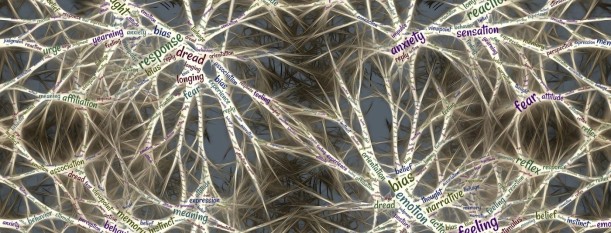
Ref.: The Source
It is when you know the intricacies of the interconnectedness of the system you seek to transform, that you will be able to do so with finesse that will confound even the most avid of your critics, as the one that is seen not to belong. When we rise to the occasion and we operate at deeper or higher stages of consciousness (depending on your perspective), the system has no choice, but to let us belong- ask Nelson Mandela, or read up on him, and you will get the gist of my point. He knew the system so well! He had 27 years to study it, reflect on it and plot what his dance and blows will be like, and with precision, he executed, with those around him. Those that followed have only themselves for not reading the script of a movie that was written as it was being acted out and directed. The threat to his dream comes from the leaders that follow, as opposed to it being ill-conceived.
3. Leading transformation of any system can only be performed through collaborativethought, acts, beliefs and systems. Find strength in collaboration. The prevalent and dominant systems across the world, thrive on autocracy, and their days are numbered. Unite with those that share the same beliefs, irrespective of how they look, and sound like. There is always strength in unity.
4. Transcend the chicken and egg situation, or a case of who is going to blink first, and the bad news is… YOU should. The oppressor will NOT do it first for you.
5. Appoint a Personal Board to look after you heart, mind and soul. The loneliest place to be in is being a Change Leader. Without a Board, you will run out of steam, and you will always have fewer options.
6. Do not wallow in you misery, and do not reject any form of assistance, however insignificant it may seem.
This article first appeared on www.linkedin.com/in/goodnews
Goodnews Cadogan is the Co-Founder and Convenor at the Centre for Courageous Authenticity in Leadership, a non-profit company that is focusing on courage and authenticity in professionalism and leadership, across all forms of organisation existence.









